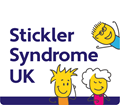Story
Stickler Syndrome UK is a non profit making organisation that provides information for families, healthcare and medical professionals affected by or caring for people with Stickler Syndrome.
Who is affected?
Stickler Syndrome affects around 1 in 7,500 to 9,000 newborn babies. If a parent has Stickler syndrome, there is a 50% chance of any children developing the condition. There are also recorded cases where the condition has occurred for the first time in a child. This is known as a spontaneous mutation.
How it affects a sufferer?
The symptoms and severity of Stickler syndrome vary from patient to patient, even within a family, and can be difficult to diagnose. There is a range of treatments and support available, and with this on-going help it is possible to learn to live within the limitations of the condition.
What are the symptoms?
Eyes
• Short sight (myopia)
• Abnormal appearance of the vitreous gel.
• High risk of retinal detachments (tearing of the lining of the eye), which may affect both eyes.
• Cataracts
• Glaucoma
Bones and Joints
• Hyper-mobile (over flexible) joints and/or stiff joints.
• Early joint disease leading to osteoarthritis and joint replacements at a younger age
Facial Features
• A full cleft, submucous or high arched palate and/or bifid uvula
• Micrognathia – where the lower jaw is shorter than the other resulting in poor contact between the chewing surfaces of the upper and lower teeth. These symptoms are like those found in Pierre Robin sequence (PRS). It is reported that 30% of children diagnosed with PRS are later re-diagnosed as having Stickler syndrome.
• Other facial characteristics include a flat face with a small nose and little or no nasal bridge. Appearance tends to improve with age
Hearing
• Hearing loss (sensorineural and or conductive). The degree varies in affected individuals and may become more severe over time.
• Glue ear in childhood caused by cleft palate.
Other symptoms
These may include curvature of the spine (scoliosis), and because of sight and hearing problems, some learning difficulties may be experienced. Many people within the support group, especially children, complain of chronic fatigue
Thanks for taking the time to visit our JustGiving page.
Donating through JustGiving is simple, fast and totally secure. Your details are safe with JustGiving - they'll never sell them on or send unwanted emails. Once you donate, they'll send your money directly to the charity. So it's the most efficient way to donate - saving time and cutting costs for the charity.
